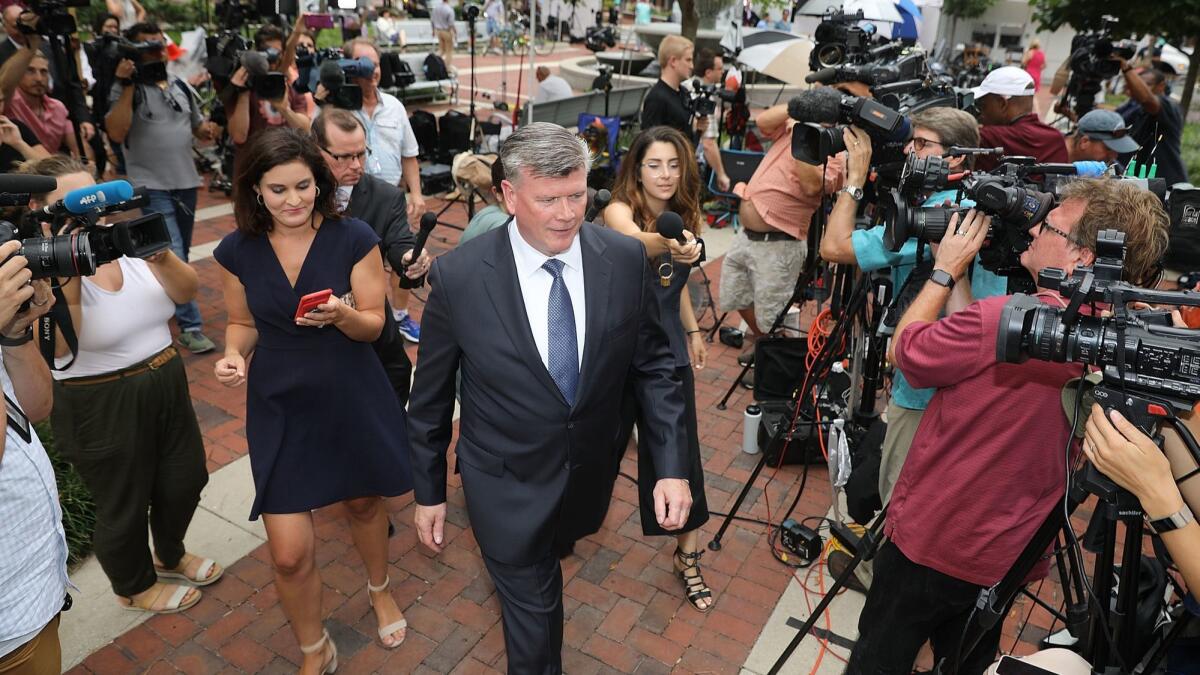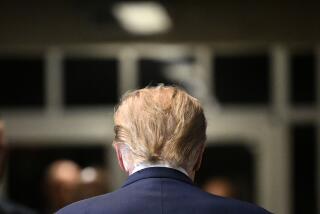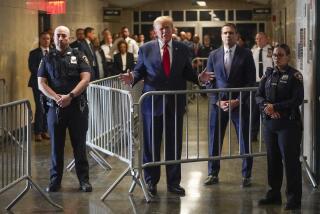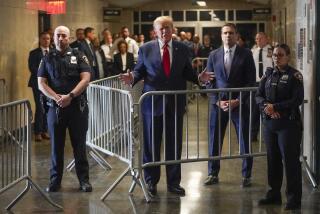It’s hurry up and wait as jury deliberates at the Manafort trial

Washington is known for its political blockbusters, but the biggest show in town this steamy summer is the Paul Manafort trial, where nervous lawyers, edgy reporters and chattering gawkers are on a hair-trigger wait for the jury to return with a verdict.
As the second day of deliberations wound down, a phalanx of TV cameras was fixed in front of the courthouse door and lawyers huddled in a hotel restaurant across the street, where a member of the defense team performed a card trick. Inside the courtroom, reporters read books or battled crossword puzzles. One played solitaire.
The courthouse bars visitors from bringing in electronic devices, so emails, social media, phone calls and the rest were off-limits. It is one of the few places in America not focused on President Trump’s latest tweets.
Manafort, 69, has said nothing to the news media since the trial began nearly three weeks ago, only “No, sir” and a few other comments to the judge when asked whether he was planning to testify. Trump’s former campaign chairman has dressed more modestly than some of the evidence would suggest, eschewing the ostrich-skin bomber jacket look for neat suits and ties, though his once-manicured coif looks more shaggy of late.
He has pleaded not guilty to 18 charges of tax evasion, bank fraud and conspiracy. If convicted, he faces a maximum of 305 years in prison. He also faces another trial on related charges next month in Washington.
For now, Manafort and the rest are waiting for a knock on the side door of the ninth-floor courtroom, a signal that the 12-member jury is ready to deliver its verdict. That could come as early as Monday, when deliberations will resume.
Manafort has been held in a courthouse jail, not the nearby detention center in Alexandria, so he can be brought in when a verdict is ready.
District Judge T.S. Ellis III, a stern figure with more than 30 years on the bench, claimed Friday he had “no idea” the case would arouse such public interest. That raised a few eyebrows given it’s the first trial stemming from the investigation led by special counsel Robert S. Mueller III, and that it involves a former top aide to the president, issues that are sure to guarantee headlines.
Asked by media organizations to release the names of jurors in the case, Ellis declined. He said he had received threats since the trial began and traveled under the protection of U.S. marshals, and he expressed concern about endangering members of the jury.
Follow live coverage of the Trump administration on Essential Washington »
Ellis isn’t just waiting around while the jury weighs the case. He heard a civil lawsuit over a man who nearly drowned in a pool during a psychotic episode. Then a sentencing for a woman whose drunken behavior aboard an airplane caused the flight to be diverted.
Trump clearly has followed the trial of his former aide — once a powerful Republican strategist, Washington lobbyist and political consultant to foreign dictators — who steered him through the contentious Republican National Convention in Cleveland two summers ago.
“I think it’s a very sad day for our country,” Trump told reporters Friday on the South Lawn of the White House when asked about the case. “He worked for me for a very short time, but you know what. He happens to be a very good person.”
Manafort worked without a salary at the top of the Trump campaign for five months. He stepped down after the New York Times reported he had received millions of dollars from the ousted government in Ukraine. His alleged attempts to hide the money in foreign bank accounts are among the charges he faces.
Media interest probably would be intense even if this weren’t August, when Congress is out of session and most sane people are anywhere but Washington, famed for its tropical summer torpor.
The courtyard outside the Albert V. Bryan U.S. Courthouse resembles a cross between a tent city and an RV park, with canopies to shade live reports by TV correspondents and satellite trucks to beam them around the world.
Daily life swirled around its edges. The New York Jets came and went at the Westin Hotel, across the street, visiting for a preseason game against the Washington Redskins. A bridal party held a photo shoot down the block. Residents navigate camera tripods while walking their dogs.
At least some of the media presence stems from the challenge of working in a courthouse where electronic devices are banned. When news breaks, reporters dash out of the courtroom and grab an elevator down to the second floor, where a pay phone — it costs 50 cents these days, by the way — is sometimes available.
Otherwise everyone rushes down the stairs or escalator and out of the building, passing word to colleagues nearby or retrieving their phones and laptops from a nearby cafe or hotel.
Other colleagues stay in the courtroom to keep taking notes and to stop a rival or a spectator, such as one of the retirees who live nearby, from claiming the just-vacated seat.
The journalists went through a fire drill of sorts on Thursday afternoon when there was a knock on the courtroom’s side door. The first knock was light, so light the U.S. marshal stationed nearby didn’t hear it. The second came a few minutes later — louder, more insistent — and the marshal sauntered over, opened the door and slipped inside.
Reporters craned their necks for a better view of the closed door. The marshal emerged with a folded piece of paper and delivered it to the clerk, who handed it to the judge.
A frenzy of activity erupted as some reporters rushed out and others rushed in. Soon the prosecutors and defense lawyers assembled at their respective tables, and Manafort himself was ushered into the courtroom.
Everyone wondered whether the jury had already reached a verdict, although one day of deliberations seemed rather quick for a complex trial involving hundreds of documents.
But the note was a list of four questions for the judge. The jurors wanted to know, among other things, a clearer definition of reasonable doubt. The judge answered the question, sent the jury home and had them reassemble on Friday morning.
Another jolt arrived Friday afternoon when the marshal retrieved a second note from the jury. The fire drill repeated itself, but there was again no verdict. The jurors just wanted the judge to know that they planned to finish their work at 5 p.m. because one of them had an event to attend.
They soon departed for the weekend and the show folded its tents until Monday.
Twitter: @chrismegerian
More to Read
Get the L.A. Times Politics newsletter
Deeply reported insights into legislation, politics and policy from Sacramento, Washington and beyond. In your inbox three times per week.
You may occasionally receive promotional content from the Los Angeles Times.







